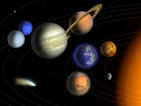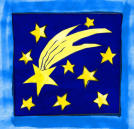
A WebQuest for 3rd Grade Science

5…4…3...2…1...
BLAST
OFF!
Your
crew has just taken off on the
X.P.L.O.R. space shuttle. You are on you way to another planet
within our
solar system. Who knows what you will encounter. Upon reaching
your
destination, your crew will explore and record data based on your
findings. Good luck and enjoy your space adventure!
The
Task
As an astronaut you are faced with many
challenges. You need to have several details established before
your
departure so that you are prepared for your galactic adventure.
As you
travel
you will need to keep in contact with mother earth. Your crew
will be
responsible for recording data based on your findings. It is very
important that this data is sent to earth on a daily basis.
This can be done by ee-mail (electronic earth mail). You are also
required to find out fascinating facts about your planet. The
chief
commander will post your destination prior to take off. As a crew
exploring the
unknown it is your responsibility to gather as much information as
possible.
This will help you during your news conference at the end of your
mission.
The
Process
Pre-Flight
Assignments:
Vocabulary List
Evaluation
This
project is
worth a total of 40 points.
 |
OUTSTANDING 10 Points |
SATISFACTORY 7 Points |
NEEDS IMPROVEMENT 3 Points |
SELF EVALUATION | TEACHER EVALUATION |
| Content
of the Daily ee-mails |
The emails contain great details
explaining the day’s findings, and any questions that the crew has. |
The emails contain details explaining the day’s findings, and any questions that the crew has. The performance characteristics reflect development and movement toward the highest level of performance. |
The emails contain some details
explaining the day’s findings, and any questions that the crew has. The performance characteristics
reflect an unsatisfactory level of performance.
|
||
| Presentation Poster & News Conference |
The presentation is very detailed. The poster is creative and shows info from all 11 questions asked. The overall presentation is well planned out, clear and detailed. | The presentation is detailed. The poster shows information from most of the 11 questions asked. The overall presentation is mostly clear and detailed. | The presentation and the poster are missing details. The overall presentation does not include a lot of details, and is not clear. | ||
| Expertise of the astronauts. | The entire group became experts of the planet they explored | The group gained a lot of information about the planet that they explored. | The group does not know a lot of details about the planet they explored. | ||
| Success of the mission |
The mission was a complete success | The mission was ¾ complete | The mission was less than ½ complete |
Conclusion
Welcome
back to earth! I hope you enjoyed your exploration in our solar
system.
You are scheduled to share the data collected at a news conference
within
3 days.
I hope that you
have learned many
fascinating facts about the planet that you have explored. Space
exploration in
the 21st century holds many amazing unknown adventures. Are you ready?
If you would like
to explore space even
further click on the above sites to explore other planets in our Solar
System.
Credits
& References
Images were found at
google.com Solar
System Graphics
Sources
Berks
County
Intermediate Unit Resources http://www.berksiu.k12.pa.us/
NASA
Kids NASA KidsExtreme
Science Extreme
Science
Arty
Astro Arty
the Part-TimeAstronaut
Welcome
to the Planets
Teacher
Page
Useful
Tips for
the planning